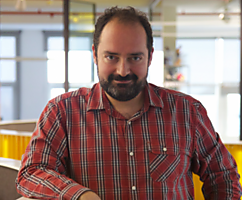Early academic learning and slows intellectual development of the child
 Bashny.Net
Bashny.Net
Early academics is harmful in the long run
In his new article in the American psychologist of evolution and development Peter gray analyzes the data of long-term studies of the influence of early training in the academic disciplines on the development of children. According to these studies, children who from the age of 4-5 years he studied reading, writing and arithmetic, is a spontaneous game, teenage and adult age, showed much lower results not only on academic knowledge but also in emotional and social sphere.

In one wide-scale study of early learning in the 1970s in Germany, graduates from 50 kindergartens from early academic training were compared with graduates of 50 kindergartens, where the emphasis was on free play and social interaction. Despite the initial slight superiority on tests of the students of the first group to the fourth grade, they showed significantly worse results than those children who are in kindergarten spent time in games and communication. The largest gap was in mathematics and reading, but also in emotional and social skills. As a result, the leadership of the German education changed the program so that the children could spend time in games instead of learning in all kindergartens.
Another long-term study was conducted among American children born in poor families and the results were similar to German. At the age of 15 years among children with academic education were two times more behavioral problems, and at the age of 23, 39 % of them had committed a crime, while in the other group only 13.5 %.
Peter gray suggests that the reason for such results may be that the early orientation of the child to success and achievement leads to a desire to compete and antisocial behavior, while of free play, the children receive skills of interaction with each other, peaceful resolution of conflicts and cooperation.
How early academic learning and slows intellectual development
Academic skills are best imparted when there is a desire and need to acquire them.
In my previous article, Peter gray reviewed various studies on early academic learning to children and concluded that such teaching is harmful in the long run. In his new article, he explains why this is happening.
There is a difference between academic and intellectual development and the reasons why the latter should precede the first. Academic skills is a common, proven methods for organization, manipulation of specific categories of knowledge, in order to achieve the desired result. For example, reading is an academic skill that includes knowledge of the letters of the alphabet, reading words aloud, based on membership of each sound to a letter. Academic skills taught in school with the help of demonstrations, memorization and repetition, and then tested.
Intellectual skills, in turn, are dealing with a person's ability to reason, to understand, to explore and to see the world around him. By nature every child is an intelligent being, full of curiosity and desire to understand their physical and social environment. Every child is born with these skills and deepens and develops through observation, play and asking questions. Teach that intellectual skills is impossible, because every child develops them himself, in his own way through self-similarbone activities. Adults can influence the development through the environment they provide to a child. If a child grows up in an environment where everyone is able to read and count, where he often read and he sees other people read or use measuring devices for practical purposes, the child sooner or later he will begin to read and count, when he will be ready for this and with minimal help from adults.
Peter gray suggests that learning academic skills of children who do not have this motivation or the necessary intellectual base, will be a waste of time and could even harm child development. This training request will be shallow, and all the acquired skills can quickly disappear after the study ends. The child is less likely to ever want to acquire these skills on their own.
published
P. S. And remember, just changing your mind — together we change the world! ©
Source: alpha-parenting.ru
In his new article in the American psychologist of evolution and development Peter gray analyzes the data of long-term studies of the influence of early training in the academic disciplines on the development of children. According to these studies, children who from the age of 4-5 years he studied reading, writing and arithmetic, is a spontaneous game, teenage and adult age, showed much lower results not only on academic knowledge but also in emotional and social sphere.

In one wide-scale study of early learning in the 1970s in Germany, graduates from 50 kindergartens from early academic training were compared with graduates of 50 kindergartens, where the emphasis was on free play and social interaction. Despite the initial slight superiority on tests of the students of the first group to the fourth grade, they showed significantly worse results than those children who are in kindergarten spent time in games and communication. The largest gap was in mathematics and reading, but also in emotional and social skills. As a result, the leadership of the German education changed the program so that the children could spend time in games instead of learning in all kindergartens.
Another long-term study was conducted among American children born in poor families and the results were similar to German. At the age of 15 years among children with academic education were two times more behavioral problems, and at the age of 23, 39 % of them had committed a crime, while in the other group only 13.5 %.
Peter gray suggests that the reason for such results may be that the early orientation of the child to success and achievement leads to a desire to compete and antisocial behavior, while of free play, the children receive skills of interaction with each other, peaceful resolution of conflicts and cooperation.
How early academic learning and slows intellectual development
Academic skills are best imparted when there is a desire and need to acquire them.
In my previous article, Peter gray reviewed various studies on early academic learning to children and concluded that such teaching is harmful in the long run. In his new article, he explains why this is happening.
There is a difference between academic and intellectual development and the reasons why the latter should precede the first. Academic skills is a common, proven methods for organization, manipulation of specific categories of knowledge, in order to achieve the desired result. For example, reading is an academic skill that includes knowledge of the letters of the alphabet, reading words aloud, based on membership of each sound to a letter. Academic skills taught in school with the help of demonstrations, memorization and repetition, and then tested.
Intellectual skills, in turn, are dealing with a person's ability to reason, to understand, to explore and to see the world around him. By nature every child is an intelligent being, full of curiosity and desire to understand their physical and social environment. Every child is born with these skills and deepens and develops through observation, play and asking questions. Teach that intellectual skills is impossible, because every child develops them himself, in his own way through self-similarbone activities. Adults can influence the development through the environment they provide to a child. If a child grows up in an environment where everyone is able to read and count, where he often read and he sees other people read or use measuring devices for practical purposes, the child sooner or later he will begin to read and count, when he will be ready for this and with minimal help from adults.
Peter gray suggests that learning academic skills of children who do not have this motivation or the necessary intellectual base, will be a waste of time and could even harm child development. This training request will be shallow, and all the acquired skills can quickly disappear after the study ends. The child is less likely to ever want to acquire these skills on their own.
published
P. S. And remember, just changing your mind — together we change the world! ©
Source: alpha-parenting.ru
Tags
See also
What to tell a child by ear so that he sleeps peacefully all night
Neveready photos - 30 amazing pictures of happy children from around the world
The concept of peace
Boys right, girls left
Svetlana roiz: Ideal school does not exist!
Robin Berman: the Parent is a benevolent dictator
Law "On protection of children from information harmful to their health and development"
Room 2-year-old girl was disgusting and tasteless, while her mother did not do it ... heroic deed!
Obstetrician Michel odent: the more tests, losing pregnant, the more cause for anxiety
Luciano Proetti a vegan diet for toddlers
















